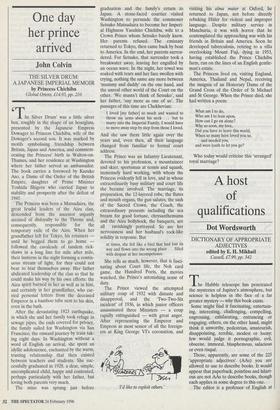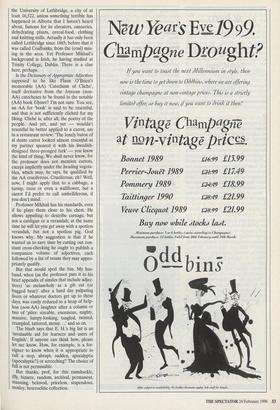A host of qualifications
Dot Wordsworth
DICTIONARY OF APPROPRIATE ADJECTIVES edited by E. H. Mikhail Cassell, £7.99, pp. 342 The Hubble telescope has penetrated the mysteries of Jupiter's atmosphere, but science is helpless in the face of a far greater mystery — why this book exists.
Some might find it fascinating, entertain- ing, interesting, challenging, compelling, engrossing, exhilarating, entrancing or engaging; others, on the other hand, might think it unworthy, pedestrian, amateurish, disappointing, terrible, modest or loony; few would judge it pornographic, evil, obscene, immoral, blasphemous, salacious or even risque.
Those, apparently, are some of the 225 `appropriate adjectives' (AAs) you are allowed to use to describe books. It would appear that paperback, pointless and hilari- ous are not AAs to describe books, though each applies in some degree to this one.
The editor is a professor of English at the University of Lethbridge, a city of at least 16,522, unless something terrible has happened in Alberta that I haven't heard about, famous for its elevators, canneries, dehydrating plants, cereal-food, clothing and knitting mills. Actually it has only been called Lethbridge since 1885; before that it was called Coalbanks, from the (coal) min- ing in the area. Yet Professor Mikhail's background is Irish, he having studied at Trinity College, Dublin. There is a clue here, perhaps.
Is the Dictionary of Appropriate Adjectives supposed to be like Flann O'Brien's memorable (AA) 'Catechism of Cliché', itself derivative from the Joycean (non- AA) catecheses to be found in the notable (AA) book Ulysses? I'm not sure. You see, an AA for 'book' is said to be resentful, and that is not sufficiently cliched for my liking. Cliché is, after all, the poetry of the people. And yet, and yet — wouldn't resentful be better applied to a carrot, say in a restaurant review: 'The lonely baton of al dente carrot looked almost resentful as my partner speared it with his Swedish- designed three-pronged fork' — you know the kind of thing. We shall never know, for the professor does not mention carrots, except implicitly under the heading vegeta- bles, which may, he says, be qualified by the AA cruciferous. Cruciferous, eh? Well, now, I might apply that to a cabbage, a turnip, cress or even a wallflower, but a carrot I'd prefer to call umbelliferous, if you don't mind.
Professor Mikhail has his standards, even if he plays them close to his chest. He allows appalling to describe carnage, but not a cardigan or a verandah; at the same time he will let you get away with a spotless verandah, but not a spotless pig. God knows why. My suggestion is that if he wanted us to save time by cutting out con- stant cross-checking he ought to publish a companion volume of adjectives, each followed by a list of nouns they may appro- priately qualify.
But that would spoil the fun. My hus- band, when (as the professor puts it in his brief appendix of similes that include adjec- tives) 'as melancholy as a gib cat (or bugged bear)' after a hard day palpating livers or whatever doctors get up to these days, was easily reduced to a heap of help- less (non-AA) laughter after a column or two of 'piles: sizeable, enormous, mighty, massive, lumpy-looking, tangled, twisted, crumpled, tattered, messy. . .' and so on.
The blurb says that E. H.'s big list is an `invaluable aid for learners and users of English'. If anyone can think how, please let me know. How, for example, is a for- eigner to know when it is appropriate to call a stop, abrupt, sudden, apocalyptic (apocalyptic?) or screeching? The choice of full is not permissible.
But thanks, prof, for this ramshackle, iffy, bizarre, random, archival, permanent, stunning, beloved, priceless, stupendous, motley, heteroclitic collection.



























































 Previous page
Previous page